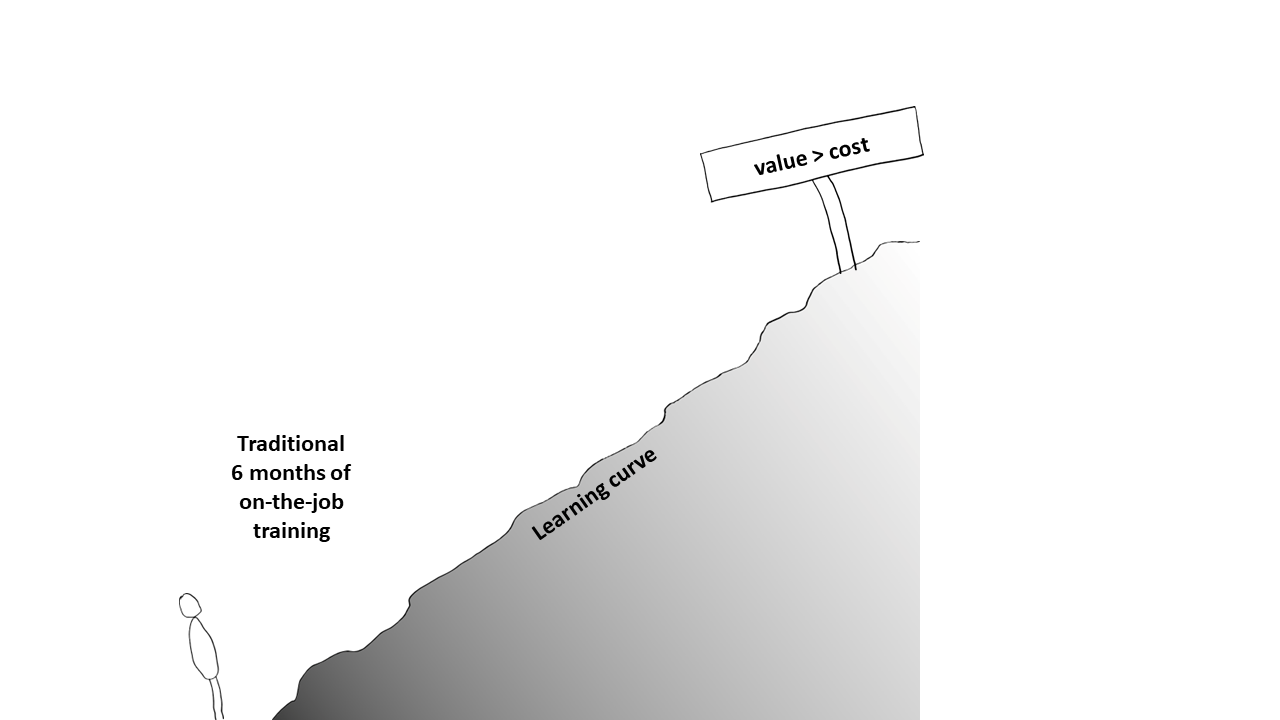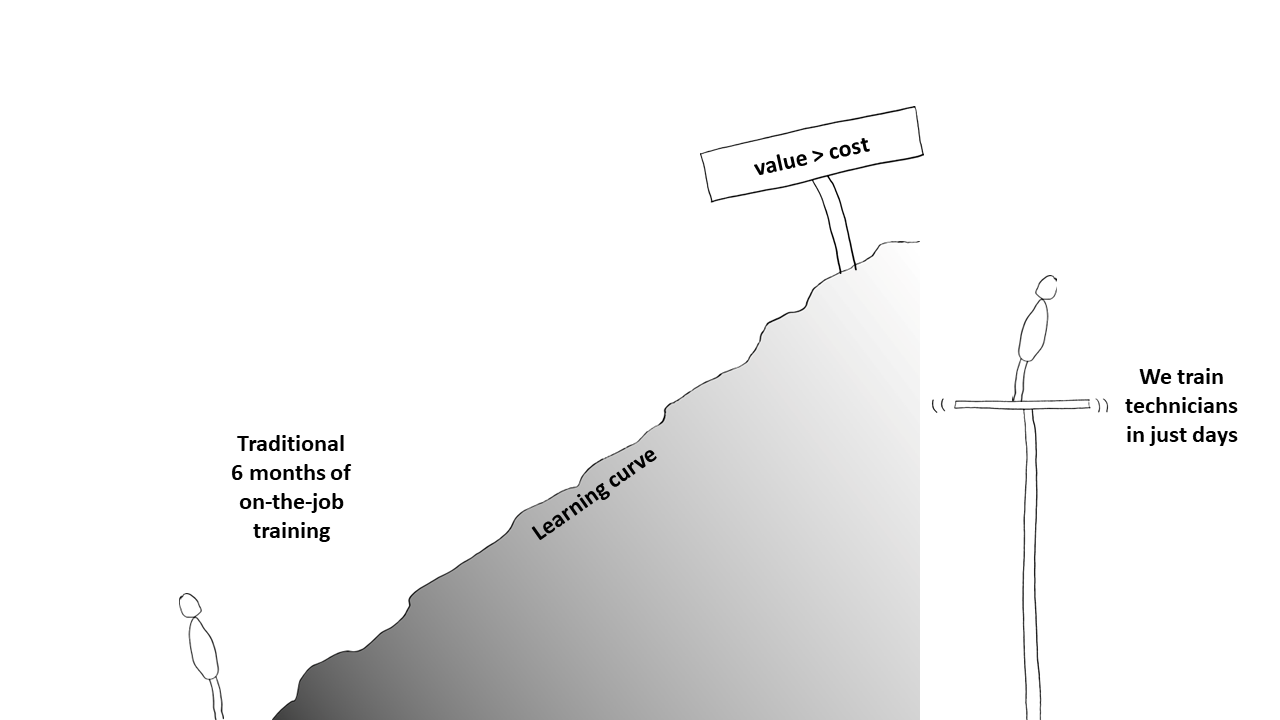
Field Sim
Field Sim develops training and electronics simulators, enabling companies to train new technicians in days rather than months.
We offer on-demand training for the skilled trades via our own online training academy, Field Sim Training (https://training.fieldsim.com).
Courses are also available in SCORM packages for deployment in enterprise learning management systems (LMS). Check out https://training.fieldsim.com/scorm-pricing/ for more details.
Additionally, we travel and conduct instructor-led training, including with the aid of electronic tools we have developed that accurately simulate field conditions. A prime example is the FS-24-TBS Troubleshooting Station. Visit https://training.fieldsim.com/troubleshooting-and-meter-skills/ to learn more.
The Problem
The skilled trades are facing historic labor shortages. Older workers are retiring and companies have been under-investing in talent for decades. ABC News in Austin recently interviewed businesses that are turning down jobs because they can't find enough skilled workers.
The good news is that people are always looking for a more rewarding career. Pew Research highlights the top reasons that people are leaving their job as 1) low pay and 2) no opportunities for advancement.
A career in the skilled trades is a great choice. Skilled trade jobs are often high-paying. Glassdoor puts the median skilled trades salary at $83,648/yr. In his excellent book, Drive, author Dan Pink explains what motivates people: autonomy in how they do their job, work that requires mastery and the opportunity to do work that makes a difference. He just described a career in the skilled trades.
Unfortunately, it's hard to get a job in the skilled trades if you don't already have the skills and experience.
The problem is that there hasn't been a great way to train new apprentices quickly and affordably. There aren't many schools for the skilled trades - especially for lower tier subcontractor trades. The occasional seminar costs thousands of dollars for a week of mostly PowerPoint. The limited training you can find is aimed at engineers and senior technicians.
The most common method for training a "green" employee is to pair them with another technician. This method takes six months before they can add meaningful value. At $15/hr, that's a burdened cost of around $25,000 to train someone new. This also loads additional responsibilities onto senior techs who are already overextended.
The risk that a newly trained person will leave after getting trained is too great for many companies to take the chance. Instead, they bid up the wages of the few experienced people who are willing to jump ship or aren't currently employed for some reason. And they increase the workload for their existing employees. Or they turn down jobs, walking away from the ability to provide growth opportunities for their employees and shrinking the profits they can deliver.
Our Solution
Field Sim Training uses 4K video-based courses to show how to do everything from roughing in electrical boxes to wiring up waterflow switches to installing speaker/strobes. Many scenes are filmed on jobsites instead of in the studio.
We train techs in just days. These are not webinars. No Death-by-PowerPoint! These courses approach training as though the apprentice or technician were in the field with the instructor learning from real-world situations. The focus is on teaching practical skills that are used in the field every day.
Our courses are sold on a per-student license model. Because the methods and skills for working in the skilled trades have evolved so little over the last 30 years, our training courses require less ongoing maintenance and updates than the software that is used to host them. We think of it as a build once - sell forever approach.
Companies can purchase bundled packages of courses for multiple employees. Each manager can assign specific courses to each of their employees and track their progress. Because our training uses a mobile-friendly approach, techs can complete their training during downtime on jobsites with little or no impact to revenue.
We also package our training materials in the industry-standard SCORM format so that companies can put our training in their own learning management system. That allows their employees to find and launch training from inside their intranet and removes the need to pay for licenses up-front.
By offloading traditional OJT to Field Sim, managers and senior technicians are free to focus on their job instead of teaching. Our training also opens up the talent pool from which employers can recruit. They no longer have to focus primarily on hiring folks with industry experience.
Circuit Engine
We have also developed simulator technology for low voltage (DC) circuits. The Circuit Engine can calculate voltage, resistance and current flow under simulated normal and adverse conditions, including reverse polarity, open circuits, and short circuits.
Following is a video showing results from what has been built so far. I'm using DBeaver to interact with the back-end. You can see the data available for the circuits in the example and you'll see results change depending on alarm state or fault condition.
The Circuit Engine differs from competing simulators because it generates real-world accurate measurements that have been verified by comparing against hundreds of physical meter readings. This level of precision enhances student learning because the numbers they see on the simulation reflect what they find in the field. Competitor solutions that round everything off to a pretty number like "12 VDC" set students up for confusion when they never see such a reading on the job.
The next step for the Circuit Engine is to offer API access for manufacturers and other customers to use it in their own simulations.
For customers who prefer a fully built solution, we will be creating a front-end GUI. We'll start with a generic interface for teaching troubleshooting and meter skills. Following that, we will offer virtualization services to manufacturers where we build custom simulators for specific products.
Here's a mockup that demonstrates a video-game based simulator that uses the Circuit Engine.
Leadership

Founder and CEO Ben Adams started his career in building technologies as a helper in 1996. Over the past 3 decades, he has held increasing roles of responsibility, including technician, project manager, sales manager, division manager, branch manager, global product leader, and GM. He has performed nearly every job in the building technology industry, including finance, product management, software engineering, hardware engineering, project estimating, sales, system design, field installation, final commissioning, inspection, maintenance, troubleshooting, and managing managers.
From 2022 to 2024, Ben took on an urgent role at Resideo (formerly Honeywell Home) where he led global software platform development. One of the top priorities was building a new event processing system in the wake of challenges with a legacy alarm delivery service that led to changes in the NFPA 72 and UL standards. This work led to Ben being asked to join the technical committee for UL 827 as a subject matter expert on auxiliary service providers.
Having worked at smaller organizations for most of his career, Ben learned how to scale from a small team into a thriving business. Before starting Field Sim in 2020, Ben led the South Texas division for Siemens Building Technologies.
For several years in the 2010s, Ben taught a 4-credit hour (full semester) class called Mastering Fire Alarm. Ben has also delivered presentations for the National Fire Protection Association, Automatic Fire Alarm Association, Society of Fire Protection Engineers, Texas Fire Marshals Association, and Building Professional Institute. From 2010 to 2016, Ben served on the North Central Texas Council of Governments Fire Advisory Board.
Ben has achieved the highest level of fire alarm technician certification, NICET Level IV and is licensed to certify fire alarm and special hazards engineering drawings in the State of Texas. He received his BBA in Finance from The University of Texas at Arlington and his MBA from Texas Christian University.
Ben writes a regular column, Fire Alarm 411, for Security Business Magazine, where he explains core fire alarm concepts in a straightforward style.

